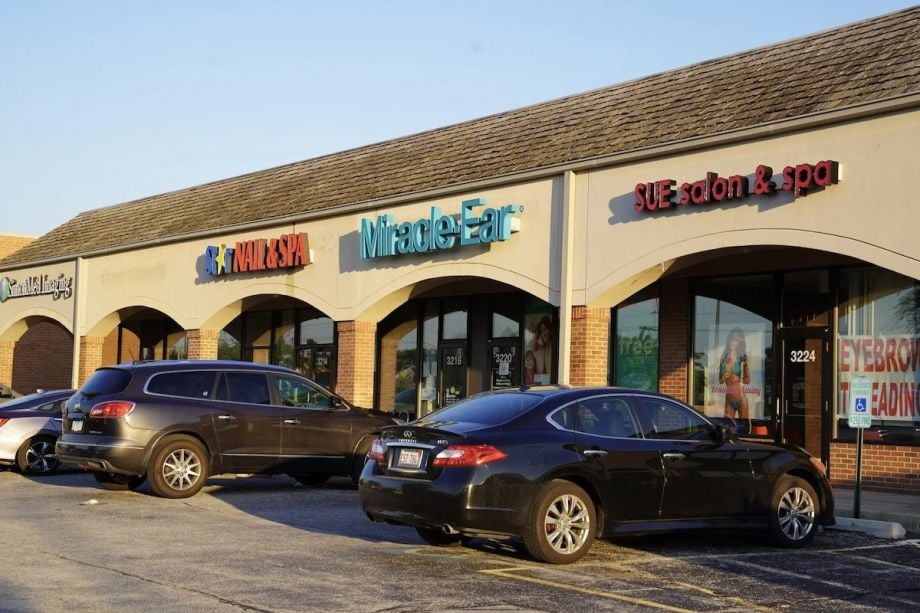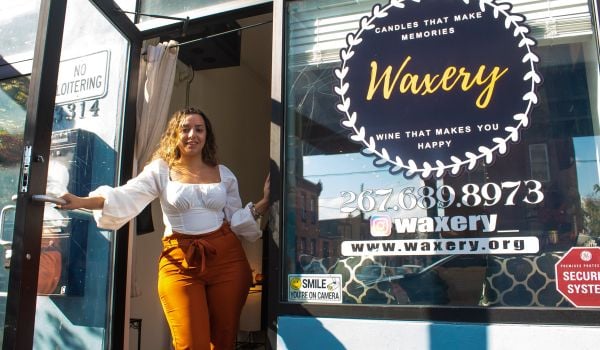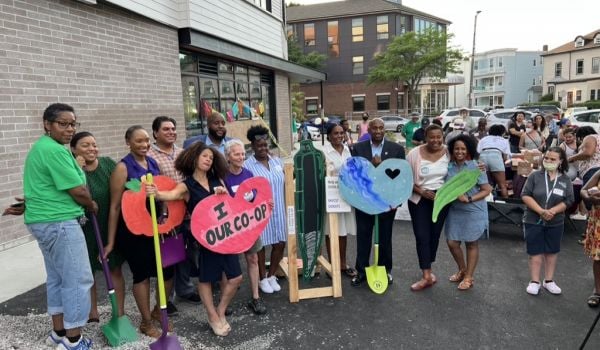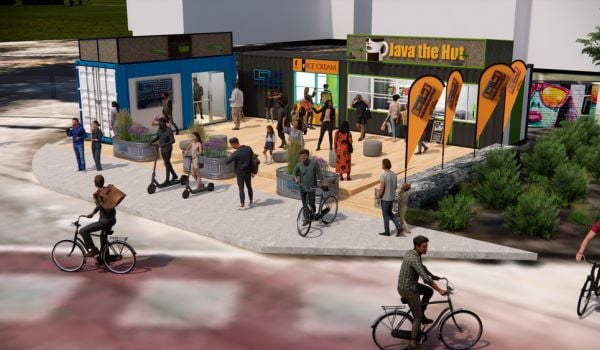Lyneir Richardson has been helping Black people buy the block since 1991 or 1992.
Then a new lawyer at the First National Bank of Chicago, Richardson occasionally had to take on pro-bono assignments that popped up related to the bank’s community reinvestment obligations. One such pro-bono assignment sent him to his childhood neighborhood on the West Side to work on loan documents for a $100,000 loan from a community-based organization to a barbershop on Chicago Avenue.
“The amount of the loan, $100,000 or $100 million, didn’t matter. It was the same documents, a promissory note, a mortgage,” Richardson says. But unlike the loan documents he reviewed daily for airlines, trucking companies and other large corporations, this loan felt meaningful. “Getting that $100,000 meant something to that guy and it meant something to that commercial corridor in a way that it didn’t mean for all those other transactions.”
Taking that experience to heart, Richardson left the bank within a year, going off to work in community development. First it was for an affordable housing developer, then later his own business building or renovating and selling single-family homes on the South and West Sides of Chicago.
“Inevitably, people would say, ‘Where would I go for a restaurant? Where’s the dry cleaner? Where’s a coffee shop?’” says Richardson, now CEO of Chicago TREND, a social enterprise working to advance strategic commercial development for Black communities in Chicago and beyond. “So that was the first time that idea was sparked for me about the importance of retail.”
This month, Chicago TREND is closing on its second shopping plaza in Baltimore, to go along with its four commercial properties in Chicago. TREND is an acronym for “Transforming Retail Economics of Neighborhood Development.” Richardson founded Chicago TREND in 2016, and since then it has become a big beneficiary of securities law changes that went into effect around that same time. The changes made it easier for non-wealthy people to use approved and regulated online platforms to do the kind of private investment previously reserved for those who are already wealthy – making it easier than ever to buy the block without running afoul of U.S. securities laws and regulations.
For its two Baltimore properties, Chicago TREND used the online platform SmallChange.co to raise a combined $780,000 from 33o investors who primarily live near or have some strong connection to either shopping plaza in predominantly-Black West Baltimore — an average of $2,363 per investor. The amount invested from the community covers only a small portion of the funds necessary to acquire and make badly needed improvements to each property, but it nets them a 49% ownership share of any profits generated by rental income from the property.
Community-based investors aren’t going to replace the entire typical capital stack for a commercial real estate project, especially if generations of systemic racism have undermined the wealth of a community. But that’s not the point.
“What we’re branding is a model we call ‘#WeOwnThis,’” Richardson says. “And ‘We’ is not just 130 people in this property and 200 people in that one. It’s broader, like that’s my uncle, that’s my cousin, I went to school with them, my grandmother, our family – we own that. And that ‘We’ in ownership, I think, as an ethos, will strengthen neighborhoods.”
Investment crowdfunding platforms like SmallChange.co started emerging around a decade ago, promising to level the playing field for investment for entrepreneurs of color or women entrepreneurs. As I reported in my first ever story for Next City, back in 2015, there were some early indications that it could, but the jury was still way, way out.
The bar was very, very low. It’s still more difficult for minority-owned or woman-owned firms to raise venture capital than firms owned by white men. Only 1.87% of venture capital is invested in firms owned by women or minorities, according to the nonprofit Diversity VC.
Investment crowdfunding platforms touted the potential to break those patterns by circumventing the typically white-male dominated world of investment committees, venture capital fund partners and boardrooms that still control a lot of private investment channels. Women and people of color could go straight to potential investors, including people they knew and more people who look like them. By broadening the mix of potential investors, it might broaden the range of who gets access to private investment.
Overall demographic numbers are hard to come by, given the plethora of platforms across the marketplace, not all of which provide even vague information on the demographics of the owners or founders of the companies or projects listed for investment. But in a 2019 study of 2,000 online investment opportunities, Investibule (a site that tracks individual investor opportunities across a range of online investment platforms) found that businesses owned by women or people of color are having relatively more success than other avenues using these platforms to raise capital, though they are raising much smaller amounts than their white or men-owned peers.
Different platforms tend to specialize in different kinds of underlying investments. WeFunder tends to be for investment in growing startup businesses, including $1 million raised for The Drivers Cooperative, a driver-owned ridesharing app built as a more driver-friendly competitor to Uber or Lyft in New York.
Honeycomb tends to be retail small businesses, new or established, who want to raise capital from their current or potential local customer base — and the platform reports that 50% of its listed small businesses were women-owned in 2020.
Meanwhile over on the Mainvest platform, which says it focuses on “brick & mortar businesses,” The Cube just raised $72,000 as a Black-mother-owned coworking space geared toward other “mompreneurs” in Baltimore. The funds are helping The Cube’s owners secure ownership of the building they’ve been renting until now.
SmallChange.co has found itself a niche in commercial or light industrial, mixed-use and affordable housing projects that all get scored according to its own social impact index, measuring attributes like walkability and bike-ability, job creation or environmental sustainability. Along with Richardson’s Chicago TREND, Black- and woman-led Philadelphia developer Mosaic Partners has raised more than $1 million for two different multi-million dollar projects on the platform.
On a much smaller scale, Brinda Devine, the manager of P8 Real Estate in Detroit, raised $43,000 on SmallChange.co for her “Kornr Store” project with a total development cost of just $341,000.
Even unorthodox entities have had success: San Francisco Community Land Trust used SmallChange.co to raise $149,400 from 41 investors as part of the $9.5 million capital stack for its largest acquisition to date.
But even with the platforms as a tool to streamline the process and help with some marketing, it’s still up to each small business or developer team to put in most of the work required to do outreach and market the opportunity to potential investors. There’s not necessarily any guarantees that the investors can be found locally.
For Chicago TREND’s projects, Richardson has attended scores of meetings, introducing himself to each surrounding community at church gatherings, neighborhood associations, senior citizens centers and other public occasions. In Baltimore, he even spent a few Saturdays set up with just a foldable table in the parking lot at Edmondson Village, introducing himself and asking patrons about what they’d like to see improved or changed about the property, inviting them to visit the SmallChange.co page for information about becoming an investor in the project.
One Baltimorean told Richardson he’d suffered a gunshot wound and two of his brothers had been shot and killed in the parking lot at Edmondson Village, which they frequented as part of their illicit business activities. But that individual has since invested in the project. It was funny, he told Richardson, to now be working to lift up a community he once helped tear down.
And according to Richardson, narratives of investors like these coming to own these properties has been crucial to convincing larger funders. Edmondson Village is a $40 million project, pulling in grants from both the city and state governments, who saw the value in supporting a project where the community would end up with a 49% ownership share.
But Richardson knows that’s just the beginning. Chicago TREND plans to acquire up to 16 retail commercial properties in predominantly Black urban neighborhoods across the country, reinvesting in them alongside the community and making sure they’re leased up with businesses that ideally don’t compete with Amazon or online shopping, forming local property management teams and imbuing in each community at least some of the knowledge and skillset it takes to develop these projects on their own in the future. It’s also a strategy betting on the fact that tying each property’s ownership and management more closely to the community will help carve out an advantage that previous owners lacked because they didn’t have those ties.
“The hardest part of this work is it’s gonna be three to five years before we’ll know if we’re even partially right,” Richardson says. “We have 340 Black local, small dollar investors, co-owners of these assets. Will those owners make a return? We certainly hope so. Will they be closer connected to this property that they invest in? We hope so. Will that help reverse depopulation in Black neighborhoods and decrease crime? We hope so. All those things are what we’re going to be evaluating over the next five years that we own these properties.”
Reporting for this story was made possible with funding from the Mastercard Impact Fund in partnership with the Mastercard Center for Inclusive Growth.
This article is part of The Bottom Line, a series exploring scalable solutions for problems related to affordability, inclusive economic growth and access to capital. Click here to subscribe to our Bottom Line newsletter.

Oscar is Next City's senior economic justice correspondent. He previously served as Next City’s editor from 2018-2019, and was a Next City Equitable Cities Fellow from 2015-2016. Since 2011, Oscar has covered community development finance, community banking, impact investing, economic development, housing and more for media outlets such as Shelterforce, B Magazine, Impact Alpha and Fast Company.
Follow Oscar .(JavaScript must be enabled to view this email address)





_600_350_80_s_c1.jpg)












